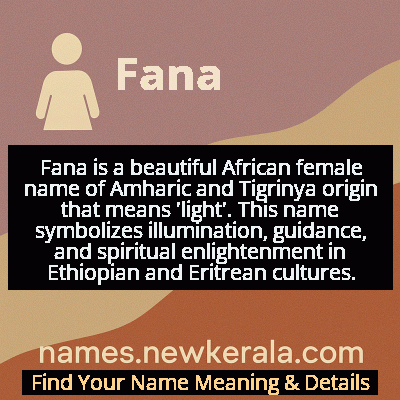Fana Name Meaning & Details
Origin, Popularity, Numerology Analysis & Name Meaning of Fana
Discover the origin, meaning, and cultural significance of the name FANA. Delve into its historical roots and explore the lasting impact it has had on communities and traditions.
Name
Fana
Gender
Female
Origin
African
Lucky Number
4
Meaning of the Name - Fana
Fana is a beautiful African female name of Amharic and Tigrinya origin that means 'light'. This name symbolizes illumination, guidance, and spiritual enlightenment in Ethiopian and Eritrean cultures.
Fana - Complete Numerology Analysis
Your Numerology Number
Based on Pythagorean Numerology System
Ruling Planet
Uranus (Rahu)
Positive Nature
Strong sense of order, loyal, practical, and disciplined.
Negative Traits
Stubborn, overly serious, rigid, and prone to feeling restricted.
Lucky Colours
Blue, gray.
Lucky Days
Saturday.
Lucky Stones
Blue sapphire.
Harmony Numbers
1, 7, 8.
Best Suited Professions
Managers, engineers, accountants, organizers.
What People Like About You
Dependability, discipline, practicality.
Famous People Named Fana
Fana Mokoena
Actor and Politician
South African actor known for roles in 'District 9' and 'Mandela: Long Walk to Freedom', also served as Member of Parliament
Fana Hlongwane
Business Consultant
Prominent South African businessman and former advisor in the arms industry
Fana Khaba
Musician
South African musician and member of the popular group Trompies
Fana Mofokeng
Photographer
Internationally recognized South African photographer known for documenting life during and after apartheid
Name Variations & International Equivalents
Click on blue names to explore their detailed meanings. Gray names with will be available soon.
Cultural & Historical Significance
The concept of 'light' in these cultures extends beyond physical illumination to encompass moral clarity, intellectual brightness, and spiritual awakening, making Fana a name that carries aspirations for the child's future character and impact on their community. In traditional contexts, the name might be chosen for a child believed to bring joy and brightness to the family, or one born during a period of renewal or celebration. The enduring popularity of light-related names across generations demonstrates their timeless appeal and the universal human appreciation for illumination in all its forms.
Extended Personality Analysis
Individuals named Fana are often perceived as naturally charismatic and intellectually bright, embodying the illuminating qualities their name suggests. They tend to be insightful problem-solvers who bring clarity to complex situations, often serving as guides or mentors within their social circles. Their presence typically radiates warmth and positivity, making them natural leaders who inspire others through their vision and optimism. Fanas are usually curious lifelong learners with a strong sense of intuition and emotional intelligence.
They balance this intellectual brightness with practical wisdom, often becoming the 'light' in their families or workplaces—the person others turn to for guidance, comfort, and perspective during difficult times. Their combination of intelligence, empathy, and natural leadership makes them effective in roles that require both heart and mind. While they can be intense in their pursuits, they typically maintain a graceful balance between ambition and compassion, using their influence to uplift rather than dominate. This makes Fanas particularly effective in educational, therapeutic, or community leadership roles where their illuminating presence can have maximum positive impact.
Modern Usage & Popularity
In contemporary usage, Fana maintains strong cultural roots while gaining international appeal through diaspora communities. The name has seen steady usage in Ethiopia and Eritrea, with increasing popularity among African diaspora families in North America and Europe seeking to preserve cultural heritage. While not among the most common names globally, it has gained recognition through prominent individuals in entertainment, business, and arts. Modern parents often choose Fana for its beautiful meaning, cultural significance, and distinctive yet accessible sound. The name's association with light and enlightenment resonates with contemporary values of wisdom, guidance, and positive influence, making it appealing to parents who wish to imbue their daughter's identity with these aspirational qualities. Its relative rarity outside African communities adds to its appeal for parents seeking unique yet meaningful names.
Symbolic & Spiritual Meanings
Symbolically, Fana represents illumination in its broadest sense—both literal and metaphorical. It signifies the light of knowledge that dispels ignorance, the light of hope that overcomes despair, and the light of truth that reveals reality. In spiritual contexts, the name evokes the concept of divine illumination and inner awakening. Metaphorically, Fana symbolizes guidance and leadership, representing someone who lights the way for others through wisdom, example, or inspiration. The name also carries connotations of purity and clarity, suggesting transparency of character and purpose. In many cultural traditions, light represents life itself, making Fana a name that embodies vitality, energy, and the essential spark of existence that connects all living beings. This rich symbolic tapestry makes the name particularly powerful for those who understand its deeper connotations beyond the simple translation.

